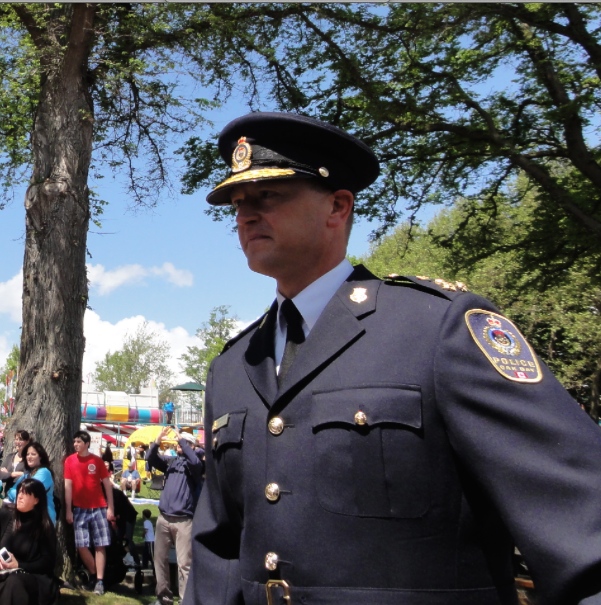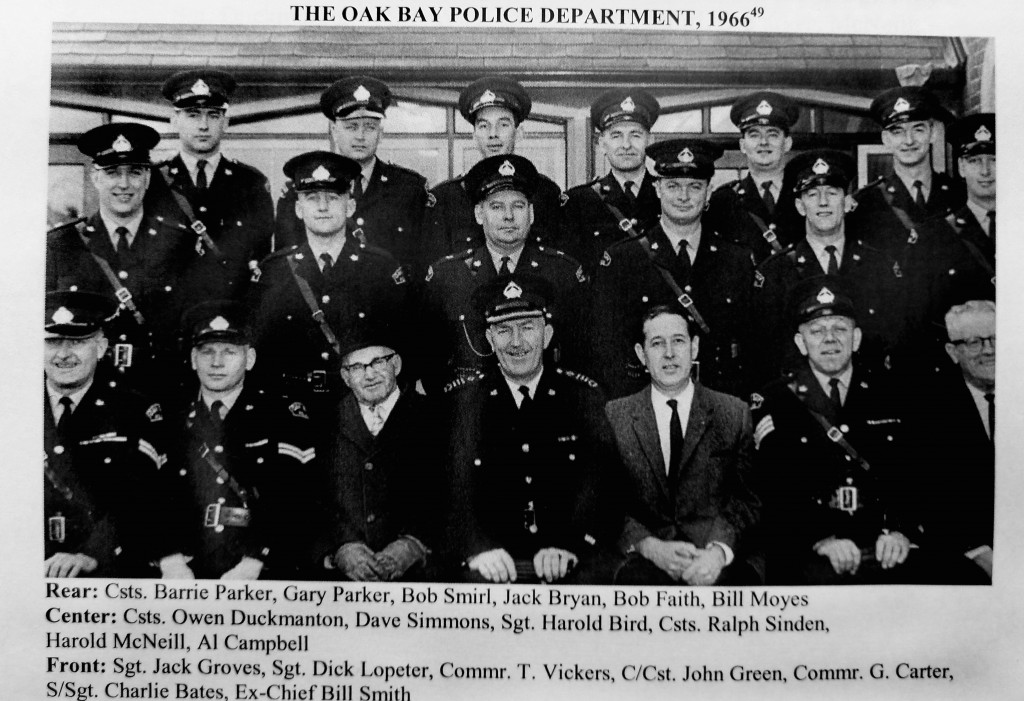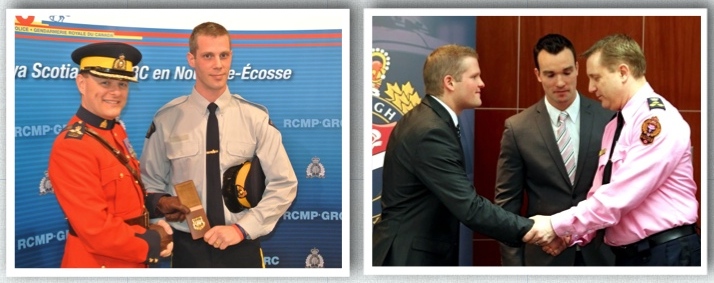Police Members and their Oath of Office
Not only did these photo ops take place on the opposite sides of Canada, the police recruits being sworn in will be entering two very different policing worlds. Their employment adventure begins with the Oath of Office they have just swore or affirmed and from that first step, their careers will diverge in a significant way that can be traced to that Oath. The photographs actually provide a rather good visual example of that difference.
Photo Left (Web Source) RCMP Associate Commander Brian Brennan, personally welcomed officer Peter Wallace into the ranks of the RCMP in Nova Scotia, presenting him with his badge during a special swearing-in ceremony.
Photo Right (Web source) Chief Frank Eisner, right, shakes hands with Casey Jones, left, and Matthew King during a ceremony to welcome the two new constables to the Victoria Police Department. (Photograph Adrian Lam, Times Colonist)
Background
As outlined in a related article, Dispensary Raids Galore!, those ‘discretionary’ raids and arrests at marihuana outlets in Nanaimo, Mission and Sechelt will waste an impressive amount of police and court time and will cost hundreds of thousands of dollars in cases where the RCMP will eventually walk away empty handed.
It is almost certain the charges will not survive beyond 2016 and as mentioned in the earlier post, will again bring the RCMP and general administration of justice into disrepute. Heaven knows the RCMP have enough administrative scandals to deal with without creating more bad press by conducting heavy handed, senseless raids.
I do not envy the front line officers ordered to carry out those raids and arrest otherwise innocent citizens, but did they have a choice? If they had been with a Municipal or City force, perhaps, but in the RCMP, probably not. For that matter, did the Superintendent in charge and who ordered the raids have a choice? Probably not.
have a choice? If they had been with a Municipal or City force, perhaps, but in the RCMP, probably not. For that matter, did the Superintendent in charge and who ordered the raids have a choice? Probably not.
An historical example of a similar dilemma comes from the very force from which Superintendent Fisher (the man who ordered the raids) recently retired as Chief Constable (photo right). The Oak Bay incident occurred decades back when then Chief John Green, ordered his men to arrest a number of teachers who were walking a peaceful picket line outside the Oak Bay High School on Cranmore Road while the teachers were in a protracted battle with the Government of the day.
The Oak Bay members knew full well the Chief’s thinking on the application of the law was flawed and his heavy-handed approach could not be supported in principle or in court. Although members had experienced his merciless tirades over the years, the members stood up to him and respectfully refused to carry out the order. The Chief  Constable was left storming and threatening disciplinary action as only an ex-Regimental Sergeant Major from World War II, could do. (1)
Constable was left storming and threatening disciplinary action as only an ex-Regimental Sergeant Major from World War II, could do. (1)
Photo (Archives): Chief John Green (Centre) and his men in 1966. I don’t think those who refused to carry out his order were yet on the job, so those men were likely fairly junior at the time as was yours truly who is standing in the second row, far right.
Days, then weeks, passed by as the strike continued with peaceful protests, picket lines and one large multi-union protest parade along Government Street to the Legislature. The Oak Bay members never heard another peep from the Chief on their refusing his order to arrest as the Chief no doubt learned he would not only lose face after losing the disciplinary battle, he might very well lose his job.
Given Oak Bay officers (as with most police in Canada) as with all police forces back in those days operated with a highly militarized command structure and many senior officers were ex-military, those who challenged the order were to be commended for holding true to their Oath of Office rather than to a momentary whim of a senior officer. This brings us back to the case at hand. Did either Superintendent Fisher or the members have a choice? This brings us back to the Oath of Office.
I think the Superintendent might have unless he was bound by an order coming from a higher authority, perhaps even the Office of the Commissioner of the RCMP. In Mark Fisher’s time as Chief Constable, he was well respected Oak Bay and must have come to understand the differences between the two types of force (RCMP and Municipal). While in Oak Bay, I cannot imagine that with the marihuana laws about to expire, he would have ordered a marihuana shop in that Municipality to be raided and the employees arrested without a clear and present danger to the public.
Having worked with and socialized with many RCMP members over the years, it was my experience they were good men and women, but the challenge they faced on a daily basis, was working in a system that was extremely ‘rank’ conscience. Several times the RCMP members would defer certain aspects of an investigation to their Municipal counterparts if what needed to be done was something that required approval from an officer at a much higher level, particularly at the Provincial or Federal level. Examples would include, surreptitious entries and crossing the US border.
It was my observation the officers with whom I worked were generally loath to step out of line by challenging an order or by acting on their own initiative when, when approval of a higher ranking authority was deemed necessary, but would be hard to get. To outright disobey was largely unthinkable, no matter the circumstance. Those who became more vigorous in their protests were soon relegated to the back waters, their careers effectively ended. Many of the men and women who leave the RCMP in favour of a City or Municipal force do so because of union protection and greater freedom to carry out their duties without being unduly restricted by the rank structure. Perhaps the Oath of Office would be a good starting point in the search for understanding the differences between RCMP and Municipal and City Police Officers.
Police Members and their Oath of Office
While discipline and a willingness to follow orders is implicit in any paramilitary organization, a police officers primary responsibility is to serve and protect the citizens of his or her community and the country in general. The essence of that commitment traces back to Sir Robert Peel and the Peelian Principles he developed in order to define an ethical police force. This short quote is taken from a larger article on the Peelian Principles:
“The approach expressed in the principles is commonly known as policing by consent in the United Kingdom and other countries such as Canada, Australia and New Zealand.[1][2][3][4] In this model of policing – police officers are regarded as citizens in uniform. They exercise their powers to police their fellow citizens with the implicit consent of those fellow citizens. “Policing by consent” indicates that the legitimacy of policing in the eyes of the public is based upon a general consensus of support that follows from transparency about their powers, their integrity in exercising those powers and their accountability for doing so.[5]
While the Oaths taken by Municipal and RCMP officers are similar in some respects, a significant difference emerges when comparing the oaths to the ideals expressed in the Peelian Principles:
Municipal Officers swear serve and protect people and their property, the ideal embodied in the Peelian Principles: “I will, to the best of my power, cause the peace to be kept and prevent all offences against the persons and properties of Her Majesty’s subjects; and, I will, faithfully, honestly and impartially perform my duties as a Police Officer.”
RCMP Officers direct their oath towards the RCMP Act and the Chain of Command: “I will faithfully, diligently and impartially execute and perform the duties required of me as a member of the Royal Canadian Mounted Police, and will well and truly obey and perform all lawful orders and instructions that I receive…” There is no reference what-so-ever to the Peelian Principles.
This difference between these Oaths of Office is not a trifling matter and might well explain a general trend within the RCMP to extend extreme deference to those higher in the chain of command be they a commissioned or non-commissioned officer. The Commissioner of the RCMP is, of course, the final authority in the Chain of Command , just as is the Chief in a Municipal Force. My experience suggests the RCMP Commissioner is a demigod as are his immediate subordinates above the rank of Superintendent. To openly challenge the order of a senior officer at the Provincial or Federal level is not punishable by death, but it certainly implies the death of ones career in the RCMP. There have been plenty examples of this sprinkled along the path over the past several decades.
Can this at least partially account for what happened in Nanaimo, Sechelt and Mission? I don’t know, but I certainly think it is a possibility. Listed in the footer is the full text of the Oaths taken by Municipal and RCMP police members on joining their respective forces.
Harold McNeill
Detective Sergeant (Retired)
Oak Bay Police Department
Municipal Police Officer Oath of Office in British Columbia
To each of these questions, the response is: “I do so swear.”
I do [swear/solemnly affirm] that:
I will, be faithful and bear true allegiance to Her Majesty Queen Elizabeth the Second, Queen of Canada, Her Heirs and Successors;
I will, to the best of my power, cause the peace to be kept and prevent all offences against the persons and properties of Her Majesty’s subjects;
I will, faithfully, honestly and impartially perform my duties as a Police Officer.
RCMP Officer Federal Oath
Note: In this oath, other than a solemn affirmation, add: So help me (Name of Deity)).
Oath of Allegiance: I do swear that I will be faithful and bear true allegiance to Her Majesty Queen Elizabeth the Second, Queen of Canada, Her Heirs and Successors.
Oath of Office: “I swear that I will faithfully, diligently and impartially execute and perform the duties required of me as a member of the Royal Canadian Mounted Police, and will well and truly obey and perform all lawful orders and instructions that I receive as such, without fear, favour or affection of or toward any person.”
Oath of Secrecy: “I do swear that I will not, without due authority, disclose or make known to any person not legally entitled to it any knowledge or information obtained by me in the course of my duties under the Royal Canadian Mounted Police Act.
It is evident that significant portions of the two oaths place an entirely different focus on how members are expected to respond in carrying out their duties to the general public. Does this account for the total difference between the two groups of police officers? Probably not, but I am thankful I joined a Municipal force rather than the RCMP, as I would not likely have lasted all that long in the RCMP. More is spoken to this in the personal background provide in the following link below.
Harold McNeill
Retired Detective Sergeant
Oak Bay Police Department
Link here to: Dispensary Raids Galore (the first part of this editorial)
Link here to RCMP Commissioner on the Wrong Track
Link here to Oversight of Police and Security Service
(1) Another lesser example of the manner in which the Chief Constable could be successfully confronted is written in the Post: Tickets, Tickets, Tickets. It is unlikely an RCMP Constable would take a chance by confronting a Superintendent in that manner.
(2) While on investigation, Conspiracy to Rob the BC Ferry Terminal as Swartz Bay), was one small example,
(1582)
Trackback from your site.


Comments (1)
I have gone through the above noted text and have found it quite informative.
I am a former member with several law enforcement agencies from across Canada.
I worked in the First Nations service under the authority of the RCMP with the over sight of the OPP. My law enforcement service was conducted under the authority of the Nishnawbe – Aski Police Service in North West Ontario the Louis Bull Police Sevice in Hobbema AB, the Kitasoo Xaixais Police Service in Northern in side passage on Swindle Island, the Lac Suel Police Service North West Ontario and the Vancouver Transit Authority Sky Train Police Service. I’m presently dealing with an RCMP member for falsifying a report against me for a road rage event. Court case is finished and the charge was dropped but I have an on going complaint with the member and have forwarded to the WATCH DOGS IN OTTAWA FOR the RCMP review and consideration. I believe the said officer is in violation of his oath of office and should be held accountable for falsifying his RTCC all the while dragging me through the court system here in Nanaimo. RCMP continue to stonewall the appeal but Ottawa and the crowns office are still looking into the matter. if your able and find the time or the interest in this very brief introduction, I would very much like to speak with you and would be grateful to hear any wisdom that may come across from your end. I served with First Nations Police Services for ten years in isolation and six years with Transit Police out of New West Minster. I do value and appreciate any time you could spare to chat for a bit on this particular subject matter. Respectfully with out anger but an open mind, Mike Fedorowich Nanaimo BC 250 667 0060